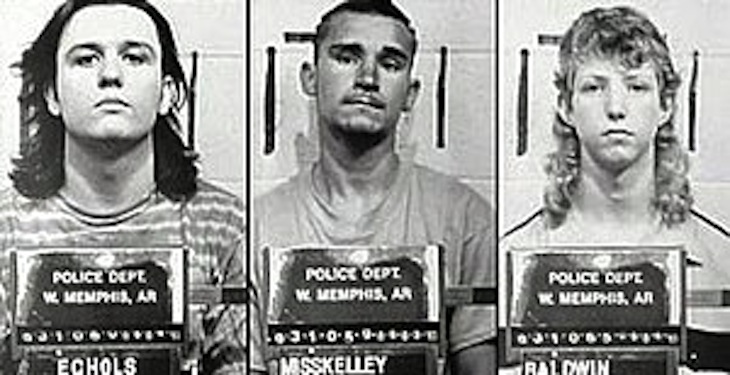Arkansas Supreme Court to allow touch DNA testing to move forward in West Memphis Three case
by April 18, 2024 12:17 pm 2,302 views

Damien Echols, Jason Baldwin and Jessie Misskelley Jr., were convicted of the murders of three 8-year-old boys in West Memphis in 1993.
The Arkansas Supreme Court ruled Thursday (April 18) that advanced touch DNA testing can be done on evidence in the “West Memphis Three” case. The decision was a reversal of Crittenden County Circuit Court Judge Tonya Alexander who in 2022 denied a motion for the DNA testing of the ligatures that bound the victims in the case.
Alexander ruled that since Damien Echols was not in prison anymore he could not seek relief in the form of DNA testing. Majority opinion writer Judge Karen Baker said the statute does not require a person to be incarcerated to seek relief under its provisions.
“Here, the plain language in sections 16-112-201 and -202 unambiguously permits ‘a person convicted of a crime’ to petition for additional DNA testing to demonstrate the person’s actual innocence pursuant to Act 1780. This language imposes no requirement that a petitioner must be in state custody to seek relief pursuant to Act 1780, and we decline to CR-22-670 13 read such a requirement into the statutes,” Baker wrote.
“It is undisputed that Echols has been convicted of a crime, and as a result, he is entitled to seek relief pursuant to Act 1780. This reading of the plain language of sections 16-112-201 and -202 is consistent with the plain language of section 16-112-103, as it is clear that ‘any person . . . who has alleged actual innocence of the offense or offenses for which the person was convicted’ is entitled to petition for a writ of habeas corpus.”
Echols praised the decision.
“We appreciate the ASC giving this ruling and hope we can now once and for all solve this case, clear our names and find the person responsible for carrying out these horrendous crimes. This is monumental. I’m grateful to my legal team and for everyone who has supported us through the years. After four more years of waiting for justice and the right to test DNA in my case, the Arkansas Court granted us the opportunity to seek justice and find the real killer (s) of three innocent children. Their decision also could provide scores of other wrongfully convicted Arkansans the ability to seek their innocence by offering them the right to test their DNA. It is tragic that at every turn, during the struggle to test crime scene evidence in this case, we were thwarted by local prosecutors, until now,” Echols said.
Echols, Jason Baldwin, and Jessie Misskelley Jr., all of Marion, entered Alford, or no contest, pleas in the deaths of 8-year-old boys Stevie Branch, Christopher Byers and Michael Moore on Aug. 19, 2011. The men, dubbed “The West Memphis Three,” have steadfastly maintained their innocence since the murders happened May 5, 1993, in West Memphis.
The three boys were riding their bikes in their West Memphis neighborhood that afternoon when they vanished. Their nude bodies were found the next day in an irrigation creek in a wooded area known as Robin Hood Hills not far from their homes. Police and prosecutors developed a theory that the boys were sacrificed in a satanic or occult ceremony and soon honed in on Echols, Baldwin, and Misskelley who were teens at the time.
Several items collected in the investigation including all the hairs that have previously been DNA tested and none were a match for the accused.
They spent 18 years in prison before they were released.
When the evidence will be tested is still unclear. Echols had previously stated he wanted the ligatures M-Vac touch DNA tested. Echols previously said he thinks whoever killed the three boys might have left their DNA on the ligatures when the boys were bound.
